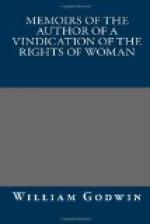In Michaelmas 1768, Mr. Wollstonecraft again removed to a farm near Beverley in Yorkshire. Here the family remained for six years, and consequently, Mary did not quit this residence, till she had attained the age of fifteen years and five months. The principal part of her school-education passed during this period; but it was not to any advantage of infant literature, that she was indebted for her subsequent eminence; her education in this respect was merely such, as was afforded by the day-schools of the place, in which she resided. To her recollections Beverley appeared a very handsome town, surrounded by genteel families, and with a brilliant assembly. She was surprized, when she visited it in 1795, upon her voyage to Norway, to find the reality so very much below the picture in her imagination.
Hitherto Mr. Wollstonecraft had been a farmer; but the restlessness of his disposition would not suffer him to content himself with the occupation in which for some years he had been engaged, and the temptation of a commercial speculation of some sort being held out to him, he removed to a house in Queen’s-Row, in Hoxton near London, for the purpose of its execution. Here he remained for a year and a half; but, being frustrated in his expectations of profit, he, after that term, gave up the project in which he was engaged, and returned to his former pursuits. During this residence at Hoxton, the writer of these memoirs inhabited, as a student, at the dissenting college in that place. It is perhaps a question of curious speculation to enquire, what would have been the amount of the difference in the pursuits and enjoyments of each party, if they had met, and considered each other with the same distinguishing regard in 1776, as they were afterwards impressed with in the year 1796. The writer had then completed the twentieth, and Mary the seventeenth year of her age. Which would have been predominant; the disadvantages of obscurity, and the pressure of a family; or the gratifications and improvement that might have flowed from their intercourse?
One of the acquaintances Mary formed at this time was with a Mr. Clare, who inhabited the next house to that which was tenanted by her father, and to whom she was probably in some degree indebted for the early cultivation of her mind. Mr. Clare was a clergyman, and appears to have been a humourist of a very singular cast. In his person he was deformed and delicate; and his figure, I am told, bore a resemblance to that of the celebrated Pope. He had a fondness for poetry, and was not destitute of taste. His manners were expressive of a tenderness and benevolence, the demonstrations of which appeared to have been somewhat too artificially cultivated. His habits were those of a perfect recluse. He seldom went out of his drawing-room, and he showed to a friend of Mary a pair of shoes, which had served him, he said, for fourteen years. Mary frequently spent days and weeks together, at the house of Mr. Clare.




